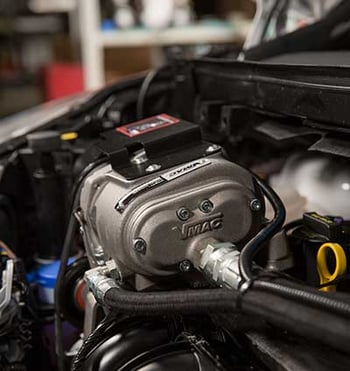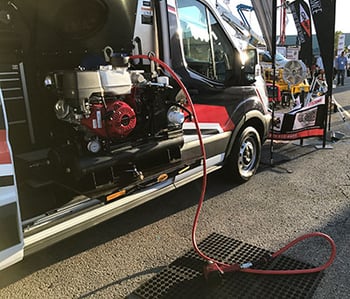Air Compressor Options For Service Vans (2024)
Service van operators who need an air compressor have one of two options: a vehicle-integrated UNDERHOOD40 air compressor that mounts in their engine compartment, or traditional standalone air compressors that mount in the cargo area.
UNDERHOOD® Air Compressors For Vans
 If vehicle weight is a concern or payload is limited, you can choose equipment that reduces vehicle weight, frees up space, maximizes operator productivity, and eliminates common safety issues.
If vehicle weight is a concern or payload is limited, you can choose equipment that reduces vehicle weight, frees up space, maximizes operator productivity, and eliminates common safety issues.
VMAC has engineered the UNDERHOOD40 Van Series, a 40 CFM rotary screw air compressor that mounts in the engine compartment on the most popular commercial vans. The UNDERHOOD40 is the only air compressor in the world with this capability and has revolutionized mobile air for service vans.
Common applications that use UNDERHOOD40 air compressors include:
- Tire servicing
- Utility/Telecom servicing
- Forklift repair
- Light duty work using small air tools
Common air tools powered by UNDERHOOD40 air compressors include:
- 3/4“ impact wrench
- Light chipping hammers
- Die grinders
- Tire inflation
Traditional air compressors mounted in the van’s cargo area can weigh as much as 375 lb, while UNDERHOOD40 air compressors weigh only 85 lb. By using a VMAC air compressor, you reduce as much as 290 lb in vehicle weight, and gain capacity for more tools and equipment.
Working closely with leading van manufacturers, VMAC ensures that mounting kits do not affect OEM warranties.
Cargo-Mounted Air Compressors For Vans
 Mounting a traditional air compressor in the cargo area is the other air compressor option for service vans. If you work with service vans, you’re probably already familiar with this solution, in which operators take an existing electric drive or gas drive air compressor and bolt it into the back of their service van.
Mounting a traditional air compressor in the cargo area is the other air compressor option for service vans. If you work with service vans, you’re probably already familiar with this solution, in which operators take an existing electric drive or gas drive air compressor and bolt it into the back of their service van.
Cargo-mounted air compressors offer a straightforward solution and allow operators to choose from a wide range of existing reciprocating and rotary screw air compressors. However, these air compressors weren’t built with service vans in mind, and there are several significant drawbacks:
Reduced Cargo Space
If you work out of a service van, you already know your cargo space is limited. Traditional air compressors are space hogs, taking up a significant amount of space that could be used as a workspace or to store additional tools and equipment.
Limited Power
Electric drive air compressors are a popular solution for service vans, but they’re limited in power. Most electric air compressors on the market today are not suitable for commercial work and don’t have the power required for modern air tools.
Toxic Fumes & Gas Spills
Vans with gas driven air compressors require adequate ventilation to eliminate the build-up of toxic fumes. Most service vans don’t have the airflow or space required to disperse these fumes, which presents a very real hazard to operators. The longer an air compressor runs inside the van, the larger the risk to anyone in the vicinity.
Further, gas driven air compressors require operators to fuel up their air compressor inside the cargo area. Spilled gas results in toxic fumes and presents an unnecessary fire hazard.
Choosing An Air Compressor For Your Service Van
Operators ultimately have three choices when considering air compressors for service vans:
- Electric drive (cargo-mounted)
- Gas drive (cargo-mounted)
- UNDERHOOD40 (engine-mounted)
The right option will depend on your budget, space requirements, weight limitations, and general regard for safety. Consider your options carefully and talk with a trusted vehicle upfitter when making your decision.
